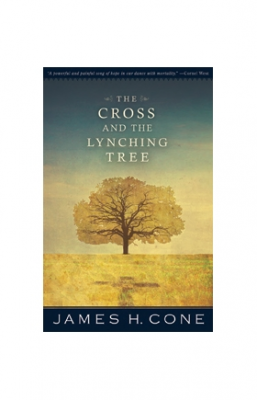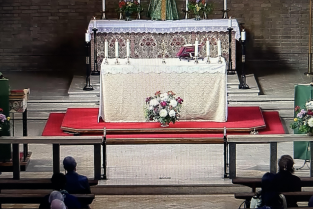Race and Christianity in America

Rebecca Tinsley reviews a new film, a museum and several books.
"My God, my God, why hast though forsaken me?" is the greatest blues line of all time, according to the African American intellectual, Stanley Crouch. For the rapper, Tupak Shakur, Jesus was, "Somebody that hurt like we hurt, that understands where we're coming from."
James Cone's "The Cross and the Lynching Tree" www.goodreads.com/book/show/12417679-the-cross-and-the-lynching-tree explains the parallels between Jesus, the innocent victim of mob hysteria in the Roman Empire's province of Judea, and almost five thousand African Americans who were lynched, mostly between 1880 and 1940. In both cases, Cone suggests, the point was not the punishment or death of the supposed offender, but a warning to those considering sedition against the powers that be - stay in your place.
At both Golgotha and in extrajudicial execution in America, thousands of people turned out for the spectacle. They enjoyed parading, mocking, humiliating and torturing their victims. In the case of lynching, it may shock readers to learn that there was nothing secret or spontaneous about the brutality. Lynchings were announced in advance in newspapers, and if the accused African American could not be located, then any randomly chosen black person would do. White women and children participated in mutilating victims before they were burned or hanged, and photographers did a roaring trade making post cards on the spot with mobile printing presses, which attendees then boastfully sent to their friends and family.
President Theodore Roosevelt described the reason lynching occurred as, "the perpetration, especially by black men, of the hideous crime of rape - the most abominable in all the category of crimes, even worse than murder." The Roosevelt quote is noteworthy for several reasons; it reflects the position of women in society as chattels made worthless by violation, as many cultures still believe now. It also perpetuates the myth that black men are all potential rapists of white women, whereas studies of supposed black-on-white rapes at the time show very few rapes occurred. Consensual sex was much more likely, with white women accusing black men of rape when they were caught out by nosey neighbours or suspicious husbands. At stake was the potential dilution of the "superior" blood of the white race. The rape of black women by white men (much more common, especially during slavery) did not provoke the same outrage.
Cone wonders why not a single sermon or theological essay by a white pastor at the time denounced lynching or pointed out the parallels between Golgotha and the fate of thousands of innocent African Americans. Reinhold Niebuhr taught at theological seminaries in Chicago and Harlem, and yet had nothing to say about the injustice he saw around him daily. He admitted he preferred not to upset his white congregations by mentioning racial inequality.
Cone also frets about the paradox of black communities finding such solace in the suffering of Jesus on the cross, while God "allowed" such suffering to afflict African Americans. Admitting he still has not squared that circle, he quotes the influential African American intellectual, W E B Du Bois, writing in the 1930s: "The church aided and abetted the Negro slave trade; the church was the bulwark of American slavery; and the church today is the strongest seat of racial or color prejudice."
Cone comments, "Cut off from their African religious traditions, black slaves were left trying to carve out a religious meaning for their lives with white Christianity as the only source to work with. They ignored white theology, which did not affirm their humanity, and went straight to stories in the Bible, interpreting them as stories of God siding with little people like them. They identified God's liberation of the poor as the central message of the Bible."
Cone's book was written in 2011, and since then a memorial to the victims of lynching has opened in Montgomery, Alabama www.cnn.com/travel/article/lynching-memorial-montgomery-alabama/index.html The museum alongside it is the work of Bryan Stevenson, author of "Just Mercy," www.goodreads.com/book/show/20342617-just-mercy which chronicles the disproportionate imprisonment of young African Americans now, in what is known as "the new Jim Crow." Although African Americans represent 10% of the US population, they make up 50% of the prison population, due to the lack of access to competent legal representation, and the punitive behaviour of judges who (Stevenson argues) give whites much more lenient punishment for the same offences. His book was less commercially successful than Ta-Nehisi Coates's "Between me and the World," http://ta-nehisicoates.com/ but far more fact-driven in analysing how the privatised penal system has monetised the mass incarceration of African Americans.
In Spike Lee's new film, BlacKKKlansman, https://en.wikipedia.org/wiki/BlacKkKlansman Harry Belafonte gives a memorable cameo as an elderly civil rights campaigner, describing a lynching. The film, set in the 1970s, tells the true story of a black policeman in Colorado Springs who infiltrated the Ku Klux Klan. It is both entertaining and disturbing, and it concludes with clips of neo-Nazis marching in Charlottesville, Virginia in 2017. Just like the lynch mobs, the protesters claimed to be defending white racial purity, while blaming an international Jewish conspiracy for the world's economic problems. President Trump famously described the marchers as "good people," inadvertently illustrating just how deeply race remains an open sore.
At the time of Barack Obama's election, in 2008, your correspondent recalls hearing white Americans claim that racism was now behind them. The books of Stevenson, Coates and Cone, and Spike Lee's new film, would suggest that was a rather optimistic interpretation of President Obama's electoral success.


















